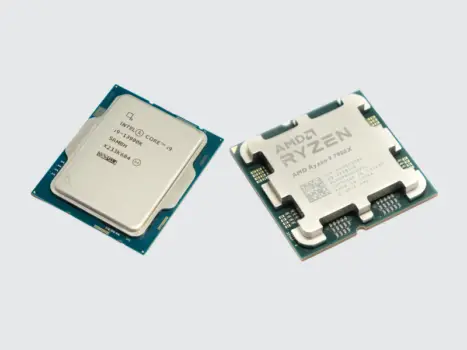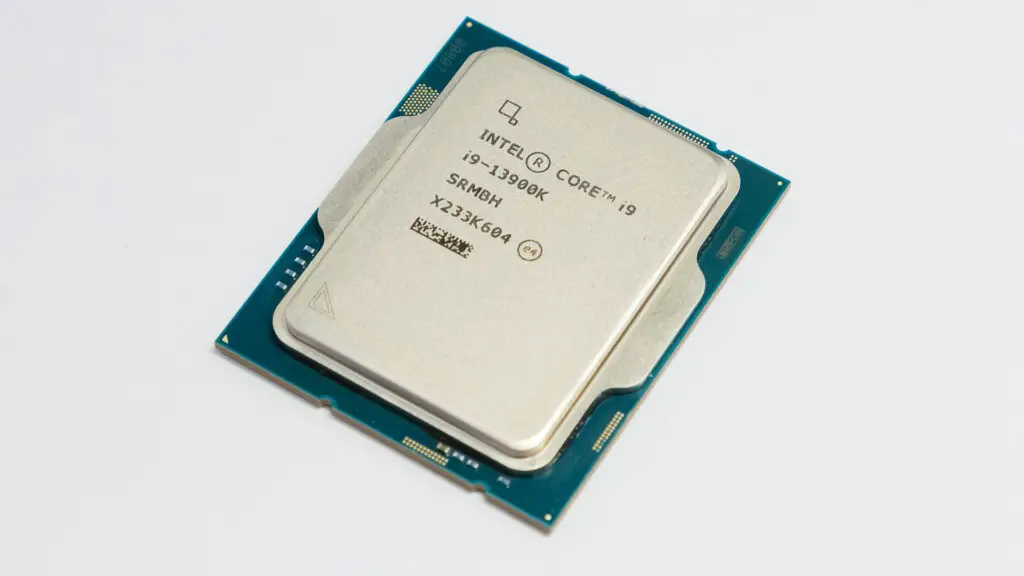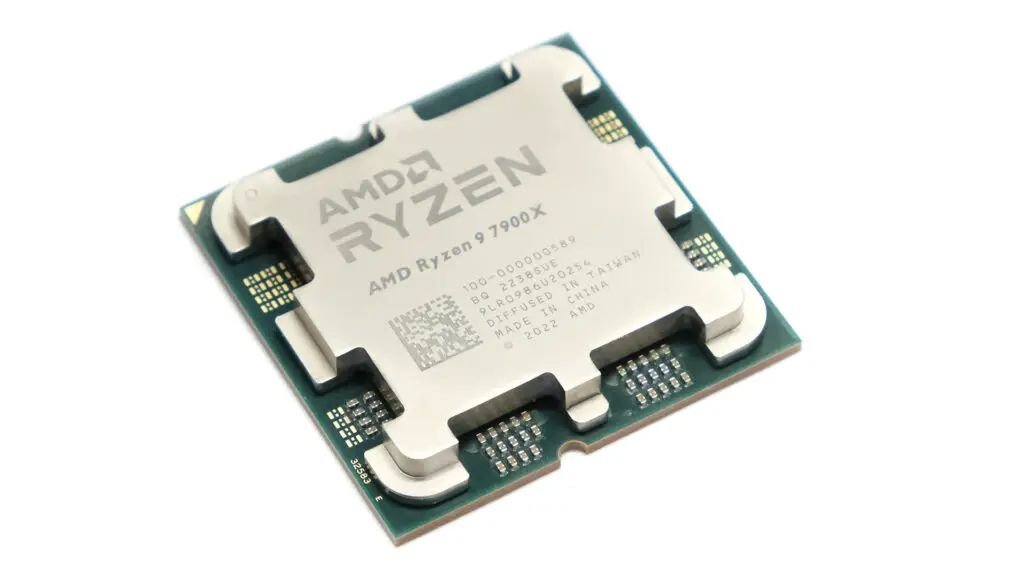Amd Ryzen 9 7900x vs Intel Core i9-13900k Comparison

The ongoing battle between AMD and Intel CPUs has reached a new peak with the AMD Ryzen 9 7900X Vs Intel Core i9-13900K. This article aims to dissect and compare these two giants in the world of processing power. Let’s delve into their features and performances and determine which one might be the right choice for you.
A Brief Note on Intel Core i9 13900K

In the thrilling world of CPUs, the Intel Core i9 13900K stands out. Launched in October 2022, it’s part of Intel’s 13th Gen, known as Raptor Lake. Here’s why it’s a top choice for many:
- Price Tag: Priced at about $589, it’s a premium option in Intel’s lineup.
- Performance Cores: It has 8 Performance (P) Cores. These cores support multithreading, making multitasking smoother. But there’s more to this CPU.
- Efficiency Cores: It doubles up on efficiency with 16 E Cores. Although they don’t support multithreading, they add to the CPU’s versatility.
- Clock Speeds:P Cores have a base speed of 3 GHz, E Cores at 2.2 GHz. The turbo speeds are even more impressive, 5.4 GHz for P Cores and 4.3 GHz for E Cores.
- RAM Support: It supports both DDR4 and DDR5 RAM. This flexibility means you can choose based on your current setup or future-proof with DDR5.
- Cache Layout: Each P core gets a 2 MB L2 Cache, and each E core cluster gets 4 MB. This totals a 32 MB L2 Cache, plus a generous 36 MB L3 Cache.
But wait, there’s a twist! The Intel Core i9 13900K also features:
- PCIe Lanes: With 20 PCIe lanes, it offers extensive expandability.
- Power Consumption: It consumes 125W base power, peaking at 253W. Is it energy-efficient enough for your needs?
So, how does this powerful processor compare to its rival, the AMD Ryzen 9 7900X? Stay tuned as we explore more in this “AMD Ryzen 9 7900x vs. Intel core i9-13900k” showdown!
A Brief Note on AMD Ryzen 9 7900X

Diving into the AMD territory, we encounter the AMD Ryzen 9 7900X, a CPU that’s making waves for its price and performance. It’s part of the AMD Ryzen 7000 Series, and here’s what makes it stand out:
- Price Point: At $549, it’s more affordable than its sibling, the Ryzen 9 7950X, yet offers substantial power.
- Core Architecture: Unlike Intel and Apple’s hybrid approach, AMD sticks to its robust “all-powerful cores” design. Including 12 cores and 24 threads, the Ryzen 9 7900X packs a punch. But how does it perform compared to the Intel Core i9 13900K?
- Zen 4 Architecture: AMD has revamped its game with the Zen 4 architecture, boasting a 13% improvement in IPC performance over its predecessors. This change meant a switch from the popular AM4 to the new AM5 socket. What does this mean for compatibility?
- Chiplet Design: The Ryzen 9 7900X features 3 chipsets, including two Core Complex Dies (CCD) with 6 cores each. It’s a unique approach, but how does it fare in real-world applications?
- Memory and Cache: Solely supporting DDR5 memory, this CPU is future-proof. With a total L2 Cache of 12 MB and a massive 64 MB L3 Cache, it’s equipped to handle heavy workloads.
- Power and Performance: With a TDP of 170 Watts, it’s relatively power-efficient. Its manufacturing nodes, TSMC 5 nm for CCD and TSMC 6 nm for IOD, contribute to its performance.
In the “amd ryzen 9 7900x vs. intel core i9-13900k” comparison, the AMD Ryzen 9 7900X brings a lot to the table. But is it enough to outshine the Intel contender? The answer might surprise you, so keep an eye out as we delve deeper into this exciting CPU rivalry!
In our comprehensive exploration of the high-octane world of modern processors, the showdown between AMD’s Ryzen 9 7900X and Intel’s Core i9-13900K stands as a titan clash, offering insights into the cutting-edge of computing performance. Yet, the story doesn’t end there. For enthusiasts and professionals alike, the broader context of these processors’ families and their respective offerings is equally intriguing. This brings us to a fascinating sibling within the AMD family – the AMD Ryzen 9 7000 7900 Dodeca-Core 3.70 GHz Processor. A gem in its own right, this processor extends the narrative of high-performance computing with its unique features and capabilities. Diving into the “AMD Ryzen 9 series comparison” offers a deeper understanding of where the 7900X fits within this formidable lineup, shedding light on how AMD is shaping the future of processing power. This comparison is not just a technical exercise; it’s a journey into the heart of what makes these processors tick and why they matter in our increasingly digital world.
Specifications: Intel Core i9 13900K vs AMD Ryzen 9 7900X
Deciding between Intel’s Core i9 13900K and AMD’s Ryzen 9 7900X? Let’s compare their specs:
Core and Thread Count: AMD Ryzen 9 7900X Vs. Intel Core i9-13900K
- Intel Core i9 13900K: 8 Performance (P) Cores (16 threads) and 16 Efficient (E) Cores (16 threads).
- AMD Ryzen 9 7900X: 12 cores (24 threads).
Clock Rates: AMD Ryzen 9 7900X Vs. Intel Core i9-13900K
- Intel Core i9 13900K:
- Performance (P) Cores: 3 GHz base, 5.4 GHz turbo.
- Efficient (E) Cores: 2.2 GHz base, 4.3 GHz turbo.
- AMD Ryzen 9 7900X:
- Base Clock Rate: 4.7 GHz.
- Turbo Clock Rate: 5.6 GHz.
Cache Memory: AMD Ryzen 9 7900X Vs. Intel Core i9-13900K
- Intel Core i9 13900K:
- L2 Cache: Total 32 MB (2 MB per P Core, 4 MB per E Core Module).
- L3 Cache: 36 MB.
- AMD Ryzen 9 7900X:
- L2 Cache: Total 12 MB (1 MB per core).
- L3 Cache: 64 MB.
Power Consumption: AMD Ryzen 9 7900X Vs. Intel Core i9-13900K
- Intel Core i9 13900K: 125 Watts base, 253 Watts max turbo power.
- AMD Ryzen 9 7900X: TDP 170 Watts.
Other Key Specs: AMD Ryzen 9 7900X Vs. Intel Core i9-13900K
- Process Node: Intel 7 (10 nm) for Core i9 13900K and TSMC 5 nm for Ryzen 9 7900X.
- Socket: LGA 1700 for Intel and AM5 for AMD.
- Memory Support: Intel supports both DDR4 and DDR5, while AMD is compatible only with DDR5.
- PCIe Lanes: Intel offers 20 lanes, while AMD provides 28 lanes.
Given these differences, it’s a tough call in the “amd ryzen 9 7900x vs intel core i9-13900k” debate. The decision hinges on what you prioritize – is it raw performance, efficiency, or future-proofing? Let’s find out as we delve further into this exciting comparison. Stay tuned!
Comparison: Intel Core i9 13900K vs AMD Ryzen 9 7900X
Pitting Intel’s Core i9 13900K against AMD’s Ryzen 9 7900X. Here’s the showdown:
The Test Systems
We’ve set up two distinct test environments to ensure a fair comparison:
- Intel Test System: It features the Core i9 13900K and other Intel CPUs paired with MSI PRO Z790-A Wi-Fi motherboard and G.Skill Trident Z5 DDR5 memory.
- AMD Test System: Housing the Ryzen 9 7900X and its AMD siblings, coupled with GIGABYTE X670E AORUS Master motherboard and similar G.Skill Trident Z5 DDR5 memory.
Both systems share common elements like the Samsung SSD, Corsair CPU Cooler, Seasonic Power Supply, and Nvidia Graphics Card.
Benchmarking Performance
How do these CPUs stack up in various benchmark tests? Let’s find out:
Cinebench R23
- Multi-Core Test: The Core i9 13900K leads with nearly 40,000 points, a 35% improvement over the Ryzen 9 7900X.
- Single-Core Test: The Core i9 13900K again outshines, surpassing the Ryzen 9 7900X by 10%.
PassMark CPU Mark
- Multithreaded/Overall: The Intel CPU shows an 18% performance boost over AMD.
- Single-Threaded: Intel’s flagship maintains an 8% lead.
Blender Open Data Render Time
- Render Time: The Core i9 13900K completes the task faster, taking 6 minutes and 20 seconds compared to Ryzen’s 7 minutes and 30 seconds.
- Samples Per Minute: Intel leads, but the difference narrows.
Adobe Suite Benchmarks
- Photoshop and Premier Pro 2022: The Intel Core i9 13900K consistently outperforms the Ryzen 9 7900X by a notable margin.
7-Zip File Manager
- Compression and Decompression: Intel excels in compression, while AMD shines in decompression.
Chromium Code Compilation
- The AMD Ryzen 9 7900X takes 4-1/2 minutes more than the Intel counterpart.
Gaming Performance
- Far Cry 6, Cyberpunk 2077, and Shadow of the Tomb Raider: Intel’s Core i9 13900K generally delivers higher FPS, showcasing its gaming prowess.
But what does this mean for you? Are raw performance numbers the sole deciding factor in the “amd ryzen 9 7900x vs. intel core i9-13900k” debate, or are there other considerations? Stay tuned as we unravel more in this CPU showdown!
Clock Speed
In the race for processing power, clock speed is key. Let’s examine how the Intel Core i9 13900K and AMD Ryzen 9 7900X fare in stress tests, focusing on their clock speeds.
AIDA64 Stress Test Results
10 minutes of the AIDA64 Stress Test pushed these CPUs to their limits. Here’s what we discovered:
Intel Core i9 13900K
- Maximum Frequency: It reached an impressive peak of 5.8 GHz.
- All-Core Average Frequency: Averages at a robust 5.4 GHz.
AMD Ryzen 9 7900X
- Maximum Frequency: Close behind, peaking at 5.6 GHz.
- All-Core Average Frequency: Maintains a solid average of 5.2 GHz.
Comparing Intel and AMD CPUs
Looking at other models for context:
- Intel CPUs: Ranging from 5 GHz to 5.8 GHz in maximum frequency, with all-core averages spanning from 4.6 GHz to 5.4 GHz.
- AMD CPUs: The frequencies vary from 4.5 GHz to 5.7 GHz at their maximum, with all-core averages holding between 4.3 GHz and 5.3 GHz.
But what does this mean in the “amd ryzen 9 7900x vs. intel core i9-13900k” contest? Does a higher clock speed translate to better overall performance? Or are there other aspects to consider? Stay with us as we explore more in this exciting CPU showdown!
CPU Temperature
Understanding CPU temperature is key in assessing the performance and longevity of processors. Let’s analyze how the Intel Core i9 13900K and AMD Ryzen 9 7900X fare in terms of heat management under stress.
AIDA64 Stress Test: Temperature Observations
During the AIDA64 Stress Test, we used the Corsair iCUE H150i RGB Elite Liquid CPU Cooler to monitor the temperatures.
Intel Core i9 13900K
- Max Temp: Reached a high of 100°C.
- Average Temp: Maintained an average of 83°C.
AMD Ryzen 9 7900X
- Max Temp: A bit cooler at 87°C.
- Average Temp: Averaged around 84°C.
Comparing Across Intel and AMD CPUs
Looking at other models in both camps:
- Intel CPUs: They show a temperature range from 87°C to 100°C at their maximum, with average temperatures spanning from 69°C to 83°C.
- AMD CPUs: These CPUs vary from 78°C to 95°C in maximum temperatures, with their average temperatures hovering between 75°C and 87°C.
In this “amd ryzen 9 7900x vs. intel core i9-13900k” comparison, we see that while Intel pushes the envelope in performance, it also tends to run hotter. AMD strikes a balance between performance and temperature. How does this affect overall performance and durability? Stay tuned as we explore more insights in this captivating CPU battle!
Power Consumption
In the world of CPUs, power consumption is a critical factor, especially for users concerned about energy efficiency and heat generation. Let’s examine the power usage of the Intel Core i9 13900K and AMD Ryzen 9 7900X during intense tasks.
Blender Render: Power Draw Analysis
Using the HWiNFO tool, we monitored the peak CPU Package Power Draw during a Blender render task.
Intel Core i9 13900K
- Peak Power Draw: Registered a high of 335 Watts.
AMD Ryzen 9 7900X
- Peak Power Draw: Significantly lower at 202 Watts.
Power Consumption Across Intel and AMD CPUs
Comparing with other models in both lineups:
- Intel CPUs: Power draw ranges from 190 Watts to 335 Watts, with the Core i9 13900K at the higher end.
- AMD CPUs: These CPUs show a more modest power draw, ranging from 116 Watts to 234 Watts.
In the “amd ryzen 9 7900x vs. intel core i9-13900k” showdown, it’s evident that while the Intel Core i9 13900K delivers powerful performance, it also demands significantly more power. The AMD Ryzen 9 7900X, however, is more power-efficient. How does this difference in power consumption impact your choice? Stay tuned as we explore further into what these findings mean for everyday users and professionals alike!
Which One Should You Buy, the Intel Core i9 13900K or AMD Ryzen 9 7900X?
Choosing between Intel’s Core i9 13900K and AMD’s Ryzen 9 7900X involves weighing various factors. Let’s dissect their strengths and weaknesses to guide your decision.
Intel Core i9 13900K: High Performance at a Cost
- Price: Retailing around $640, it’s not a budget-friendly option.
- Performance: Excels in gaming and productivity tasks.
- Power and Heat: The main drawbacks are its high power consumption and heat generation. It’s the most power-hungry and hottest CPU in our tests.
AMD Ryzen 9 7900X: A Cooler, Power-Efficient Alternative
- Cooler Operations: Runs significantly cooler than the Intel counterpart.
- Lower Power Draw: Consumes 130 Watts less than the Core i9 13900K.
- Performance: Though it falls short in direct competition with the Core i9 13900K, it’s still a formidable processor.
Considering Alternatives
- For Multithreaded Workloads: The AMD Ryzen 9 7950X, though pricier by $150, provides close competition to the Core i9 13900K.
- For Gamers: If gaming is your primary concern, the Intel Core i7 13700K is a more cost-effective and cooler alternative.
In the “amd ryzen 9 7900x vs. intel core i9-13900k” debate, the choice ultimately hinges on your specific needs and priorities. Do you prioritize raw performance over power efficiency and heat? Or is a balance of performance and efficiency more crucial for your tasks? Deciphering these questions will guide you to the correct decision. Stay tuned for more insights into this intriguing CPU comparison!

